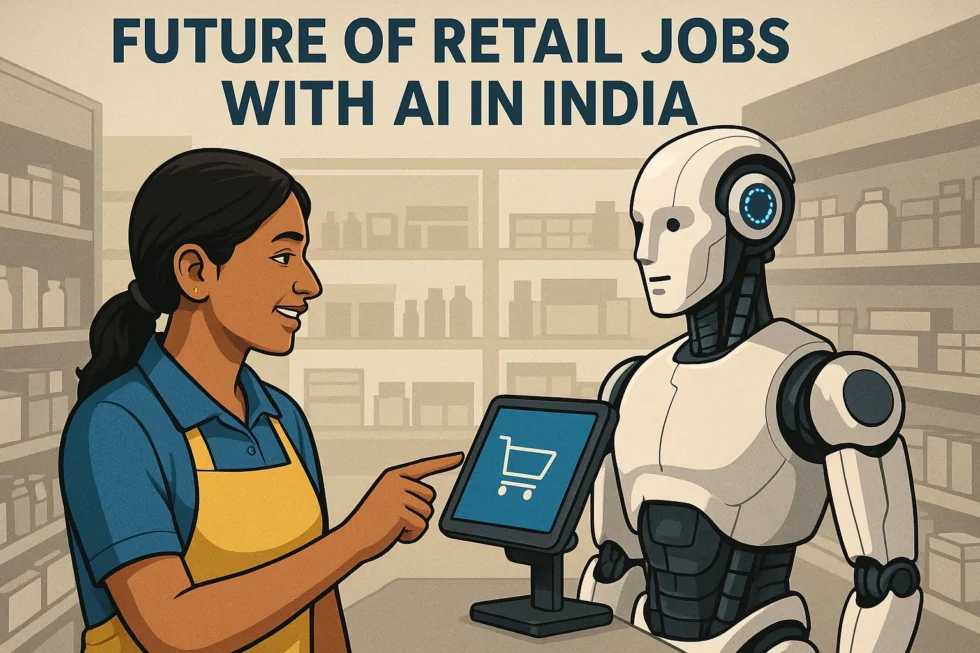
Future of retail jobs with AI in India
The future of retail jobs in India is not a zero-sum game of AI versus human labour. It is a fundamental shift from task-based work to value-based work, driven by consumer demand for frictionless, personalised experiences. The simplistic narrative of mass unemployment fails to recognise the complex and nuanced reality of a sector undergoing a necessary technological evolution.
The Great Unbundling: Tasks, Not Jobs
The first wave of change is the unbundling of traditional retail roles. AI will not eliminate the store associate; it will automate their most repetitive tasks. Consider the following:
- Inventory & Stocking: Computer vision and RFID tags are replacing manual stock counts. AI-powered systems can predict demand with unprecedented accuracy, automating replenishment orders—the human job shifts from counting boxes to overseeing technology and handling complex, non-routine exceptions.
- Checkout & Billing: Self-checkout kiosks and contactless payment systems are already standard in modern retail chains like Reliance Retail and DMart. AI-powered sensors in stores like Amazon eliminate the need for a cashier. This doesn’t spell the end of the front-line worker, but reallocates their time to high-value interactions like customer service and sales.
The new currency of the retail employee will be human connection and problem-solving, not efficiency in performing mundane tasks.
The Human 2.0: Augmentation, Not Replacement
The real transformation lies in the creation of new, AI-augmented roles. These positions leverage a human’s unique ability to empathise, strategise, and build relationships—skills AI cannot replicate.
- The ‘Experience Manager’: Store associates will transition from being transaction-takers to “experience managers.” Armed with data from AI-driven tools, they can instantly access a customer’s purchase history and preferences, offering personalised recommendations. This moves the interaction from a simple transaction to a curated, high-touch consultation.
- The ‘AI Trainer’ & ‘Data Interpreter’: As AI systems proliferate, new technical roles emerge. Retail companies will need employees who can monitor, train, and troubleshoot AI models. They will need analysts who can interpret AI-generated data to understand consumer behaviour and optimise store layouts. This is a new class of digital-native retail jobs.
The Indian Context: A Unique Trajectory
The impact of AI in India will follow a two-speed model. While major chains will adopt AI at a rapid pace to compete with e-commerce giants like Amazon and Flipkart, the vast unorganised retail sector (the kirana stores) presents a different dynamic.
For these small businesses, AI is not a threat but a lifeline. Platforms like Udaan and JioMart use AI to digitise B2B supply chains, providing small retailers with better credit terms, demand forecasting, and inventory management. Here, AI acts as an enabler, not a competitor, empowering these businesses to survive and thrive against larger, more organised players.
The Bottom Line
The future of retail jobs is an unavoidable skill shift. The focus moves away from the transactional and toward the relational. India’s retail workforce must adapt by acquiring skills in digital literacy, data interpretation, and customer relationship management. The key to navigating this transition is not to resist automation, but to embrace the augmentation it provides, allowing the human element to provide the value only it can.
ہندوستان میں مصنوعی ذہانت کے ساتھ خوردہ ملازمتوں کا مستقبل
ہندوستان میں خوردہ ملازمتوں کا مستقبل مصنوعی ذہانت بمقابلہ انسانی مزدوری کا صفر رقم کا کھیل نہیں ہے۔ یہ ٹاسک پر مبنی کام سے قدر پر مبنی کام کی طرف ایک بنیادی تبدیلی ہے ، جس کی وجہ صارفین کی رگڑ سے پاک ، ذاتی تجربات کی مانگ ہے۔ بڑے پیمانے پر بے روزگاری کا سادہ سا بیانیہ ایک ایسے شعبے کی پیچیدہ اور باریک حقیقت کو تسلیم کرنے میں ناکام رہا ہے جو ضروری تکنیکی ارتقاء سے گزر رہا ہے۔
دی گریٹ ان بنڈلنگ: ٹاسک، نوکریاں نہیں
:تبدیلی کی پہلی لہر روایتی خوردہ کرداروں کو ختم کرنا ہے۔ اے آئی اسٹور ایسوسی ایٹ کو ختم نہیں کرے گا۔ یہ ان کے سب سے زیادہ تکرار والے کاموں کو خودکار بنائے گا۔ مندرجہ ذیل پر غور کریں
انوینٹری اور اسٹاکنگ: کمپیوٹر وژن اور آر ایف آئی ڈی ٹیگ دستی اسٹاک گنتی کی جگہ لے رہے ہیں۔ مصنوعی ذہانت سے چلنے والے نظام غیر معمولی درستگی کے ساتھ طلب کی پیش گوئی کرسکتے ہیں ، دوبارہ بھرنے کے آرڈرز کو خودکار بنا سکتے ہیں۔ انسانی کام باکسوں کی گنتی سے ٹیکنالوجی کی نگرانی اور پیچیدہ ، غیر معمول کے استثنیات کو سنبھالنے کی طرف منتقل ہوتا ہے۔
چیک آؤٹ اور بلنگ: ریلائنس ریٹیل اور ڈی مارٹ جیسی جدید ریٹیل چینز میں سیلف چیک آؤٹ کیوسک اور کانٹیکٹ لیس پیمنٹ سسٹم پہلے ہی معیاری ہیں۔ ایمیزون گو جیسے اسٹورز میں مصنوعی ذہانت سے چلنے والے سینسر کیشئر کی ضرورت کو ختم کرتے ہیں۔ یہ فرنٹ لائن ورکر کے اختتام کا اعلان نہیں کرتا ہے ، لیکن ان کا وقت کسٹمر سروس اور فروخت جیسے اعلی قیمت کے تعامل ات کے لئے دوبارہ مختص کرتا ہے۔
خوردہ ملازم کی نئی کرنسی انسانی رابطہ اور مسئلہ حل کرنا ہوگی ، نہ کہ دنیوی کاموں کو انجام دینے میں کارکردگی۔
ہیومن 2.0: اضافہ، متبادل نہیں
حقیقی تبدیلی نئے، مصنوعی ذہانت میں اضافے والے کرداروں کی تخلیق میں مضمر ہے۔ یہ عہدے انسان کی ہمدردی، حکمت عملی اور تعلقات قائم کرنے کی انوکھی صلاحیت کا فائدہ اٹھاتے ہیں – ایسی مہارتیں جو مصنوعی ذہانت نقل نہیں کر سکتی۔
‘تجربہ مینیجر’: اسٹور ایسوسی ایٹس لین دین کرنے والے سے ‘تجربہ مینیجرز’ میں منتقل ہوجائیں گے۔ مصنوعی ذہانت سے چلنے والے ٹولز کے ڈیٹا سے لیس ، وہ فوری طور پر گاہک کی خریداری کی تاریخ اور ترجیحات تک رسائی حاصل کرسکتے ہیں ، ذاتی سفارشات پیش کرتے ہیں۔ یہ بات چیت کو ایک سادہ لین دین سے ترتیب شدہ ، اعلی ٹچ مشاورت میں منتقل کرتا ہے۔
‘اے آئی ٹرینر’ اور ‘ڈیٹا انٹرپریٹر’: جیسے جیسے مصنوعی ذہانت کا نظام پھیلتا ہے، نئے تکنیکی کردار ابھرتے ہیں۔ ریٹیل کمپنیوں کو ایسے ملازمین کی ضرورت ہوگی جو اے آئی ماڈلز کی نگرانی، تربیت اور مسائل کا ازالہ کرسکیں۔ انہیں ایسے تجزیہ کاروں کی ضرورت ہوگی جو صارفین کے رویے کو سمجھنے اور اسٹور کی ترتیب کو بہتر بنانے کے لئے مصنوعی ذہانت سے تیار کردہ اعداد و شمار کی تشریح کرسکیں۔ یہ ڈیجیٹل مقامی خوردہ ملازمتوں کی ایک نئی کلاس ہے۔
دی انڈین سیاق و سباق: ایک انوکھا راستہ
ہندوستان میں مصنوعی ذہانت کا اثر دو رفتار ماڈل کی پیروی کرے گا۔ ایمیزون اور فلپ کارٹ جیسی ای کامرس کمپنیوں کے ساتھ مقابلہ کرنے کے لئے بڑی زنجیریں تیز رفتاری سے مصنوعی ذہانت کو اپنائیں گی ، لیکن وسیع غیر منظم خوردہ شعبہ (کرانا اسٹور) ایک مختلف متحرک پیش کرتا ہے۔
ان چھوٹے کاروباروں کے لئے، مصنوعی ذہانت ایک خطرہ نہیں بلکہ ایک لائف لائن ہے. اڑان اور جیو مارٹ جیسے پلیٹ فارم بی ٹو بی سپلائی چین کو ڈیجیٹائز کرنے کے لئے مصنوعی ذہانت کا استعمال کرتے ہیں ، جو چھوٹے خوردہ فروشوں کو بہتر کریڈٹ شرائط ، طلب کی پیش گوئی اور انوینٹری مینجمنٹ فراہم کرتے ہیں۔ یہاں، مصنوعی ذہانت ایک حریف کے بجائے ایک معاون کے طور پر کام کرتی ہے، جو ان کاروباروں کو بڑے، زیادہ منظم کھلاڑیوں کے خلاف زندہ رہنے اور پھلنے پھولنے کے لئے بااختیار بناتی ہے۔
نتیجہ
خوردہ ملازمتوں کا مستقبل ایک ناگزیر مہارت کی تبدیلی ہے۔ توجہ لین دین سے ہٹ کر رشتہ دار کی طرف چلی جاتی ہے۔ ہندوستان کی خوردہ افرادی قوت کو ڈیجیٹل خواندگی ، اعداد و شمار کی تشریح ، اور کسٹمر ریلیشن شپ مینجمنٹ میں مہارت حاصل کرکے خود کو ڈھالنا چاہئے۔ اس منتقلی کو نیویگیٹ کرنے کی کلید آٹومیشن کی مزاحمت کرنا نہیں ہے ، بلکہ اس کے ذریعہ فراہم کردہ اضافے کو اپنانا ہے ، جس سے انسانی عنصر کو صرف وہ قدر فراہم کرنے کی اجازت ملتی ہے جو وہ کرسکتا ہے۔








